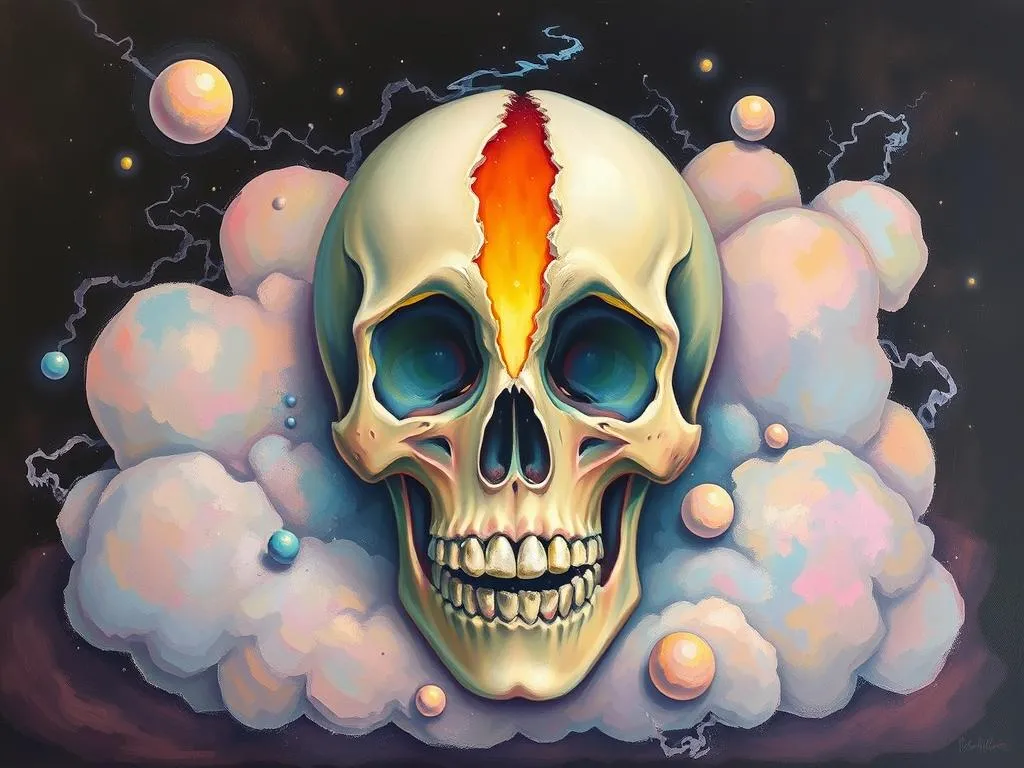
Introduction
Dreams have always captivated human curiosity, serving as a mysterious gateway into our subconscious. Among the myriad of dreams that people experience, those involving bizarre or unsettling imagery often leave a particularly lasting impression. One such striking vision is that of a gap in the skull. This dream can evoke feelings of vulnerability, confusion, or even fear, prompting those who experience it to seek deeper understanding. The significance of dreaming about a gap in the skull can vary widely based on personal experiences and contexts, making it a rich topic for exploration.
Dreams about skulls, in general, often represent the mind, identity, and mortality. However, the specific image of a gap introduces an intriguing twist, hinting at themes of loss, incompleteness, and the struggle for clarity. This article will delve into the symbolism, variations, and real-life connections of dreaming about a gap in the skull, offering insights that can aid in personal reflection.
Symbolism and Meaning
The skull itself is a powerful symbol, often associated with death, wisdom, and the fragility of life. When a gap is introduced, it represents a break in these associations. This could symbolize a feeling of incompletion or a disruption in one’s mental state. From a psychological perspective, a gap in the skull can reflect cognitive dissonance—the mental discomfort experienced when holding two contradictory beliefs or ideas.
In some interpretations, the gap might signify a lack of understanding or insight into oneself or a particular situation. It may indicate that the dreamer is struggling to piece together their thoughts or feelings, suggesting a need for introspection and self-examination. In this way, the dream can act as a prompt to seek clarity, urging the dreamer to confront unresolved issues or emotions.
Moreover, the gap may also symbolize vulnerability. The skull protects the brain, which houses our thoughts and personality. A gap implies a breach in this protective barrier, suggesting that the dreamer may feel exposed or at risk in their waking life. This can resonate particularly during times of transition or uncertainty, such as personal loss, career changes, or relationship challenges.
Culturally, the skull has various meanings. In some traditions, it is a symbol of rebirth or transformation. Thus, the gap could be interpreted as an invitation to release old beliefs and embrace new perspectives. This interpretation can lead to personal growth, suggesting that the dreamer may need to let go of outdated views or fears to move forward.
Ultimately, the meaning of dreaming about a gap in the skull is deeply personal, shaped by individual experiences, emotions, and circumstances. Reflecting on what the skull represents to you can help uncover its specific significance in your dreams.
Key Scenarios and Variations
Dreams are inherently subjective, and the context in which the dream occurs can significantly alter its interpretation. For instance, if you dream of discovering a gap in your own skull, it may evoke feelings of self-doubt or insecurity, suggesting you are questioning your identity or worth. Conversely, witnessing someone else with a gap in their skull might reflect your concerns about their wellbeing—be it emotional, mental, or physical. This scenario can indicate a desire to help others or a fear of losing someone close to you.
Another variation to consider is the presence of blood or fluid seeping from the gap. This imagery can amplify the feelings of danger or urgency, suggesting that the issues represented by the gap are causing emotional turmoil or distress. This can be a signal to the dreamer that they need to seek support or address their feelings more directly.
In some cases, the dream may involve attempts to fix or heal the gap. This act can symbolize the dreamer’s desire for resolution or clarity in their waking life. If you find yourself actively working to mend the gap in the dream, it may suggest a proactive approach to tackling your fears or uncertainties.
Additionally, dreaming of a gap in the skull while in a public space can indicate feelings of exposure or vulnerability in social situations. It may reflect anxieties about judgment or criticism from others. In contrast, dreaming of the gap in a safe environment, like your home, may suggest internal conflicts that you are more comfortable addressing but still need to confront.
Each of these scenarios adds layers of meaning to the dream, showing that context plays a crucial role in interpretation. By considering the various situations and emotions experienced during the dream, you can gain a deeper understanding of its implications.
Real-Life Connections and Takeaways
Connecting dreams to real-life experiences can provide valuable insights and opportunities for growth. If you have recently dreamed of a gap in your skull, consider what aspects of your life may feel incomplete or vulnerable. Are there unresolved conflicts or emotions that need your attention? Reflecting on these questions can guide you toward greater self-awareness and understanding.
One practical approach is to keep a dream journal. Recording your dreams shortly after waking can help you track recurring themes and symbols, allowing you to analyze patterns over time. Jot down not only the details of the dream but also your feelings and thoughts surrounding it. This practice can reveal connections between your dreams and waking life, facilitating a deeper exploration of your subconscious mind.
Additionally, consider engaging in self-reflection or mindfulness practices. Meditation or journaling can provide a space for you to explore the emotions and thoughts that arise from your dream. This can help you identify areas of your life that may require attention or healing. If the dream evokes feelings of fear or vulnerability, it may be beneficial to seek support from a trusted friend or therapist. Sharing your thoughts can alleviate the burden and offer new perspectives.
Moreover, if the gap symbolizes a desire for transformation, consider what beliefs or habits may be holding you back. Embracing change can be daunting, but confronting fear and uncertainty can lead to personal growth and empowerment. Reflect on what new perspectives or paths you might explore in your waking life.
In summary, dreams about gaps in the skull can serve as powerful prompts for introspection and personal development. By examining the symbolism, variations, and real-life connections of these dreams, you can gain insights that foster self-discovery and resilience. Take time to reflect on your experiences and feelings, and be open to the possibilities of growth that may arise from this exploration.
Conclusion
Dreams are a profound expression of our inner world, revealing thoughts, emotions, and concerns we may not consciously acknowledge. The image of a gap in the skull holds rich symbolism, representing vulnerability, incompleteness, and the quest for clarity. By exploring its meanings, variations, and connections to real life, we can better understand ourselves and our experiences.
As you reflect on your dream, consider the personal significance of the skull and the gap within it. What do they reveal about your thoughts, feelings, and circumstances? Embrace the opportunity for self-reflection, and allow your dreams to guide you toward greater understanding and growth. Your subconscious may be offering vital insights that can illuminate your path forward.







